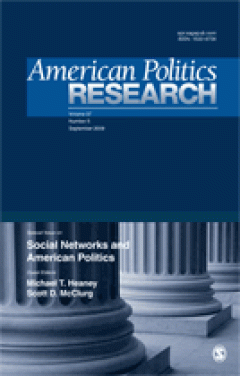Filter by

Context, Black Empowerment, and African American Political Participation
Activists and scholars argue that the election and presence of Black mayors increase Black political engagement; however, later research suggests that this diminishes over time. Furthermore, a body of research suggests that homogenous racial contexts and contextual poverty decrease political participation. In this article, we ask one question: How does demographic context and length of Black ma…
- Edition
- Vol. 38 no. 5, September 2010.pp. 909-930
- ISBN/ISSN
- 1532673x
- Collation
- -
- Series Title
- American Politics Research
- Call Number
- -

Divisive Primaries and Incumbent General Election Performance: Prospects and …
Do divisive primaries hurt incumbents? If so, does the electoral calendar condition their effects? Potential challengers are predatory and estimate their electoral chances before running against an incumbent, meaning electoral prospects influence both primary divisiveness and general election performance. However, divisive primaries may waste precious campaign resources and damage the primary w…
- Edition
- Vol. 38 no. 5, September 2010.pp. 931-955
- ISBN/ISSN
- 1532673x
- Collation
- -
- Series Title
- American Politics Research
- Call Number
- -

Childhood, age of consent and moral regulation in Canada and the UK
This paper analyses the resurgent regulation of young people's sexuality in Canada and the UK and examines notions of childhood in relation to adulthood, referred to by the term 'generation', as they are portrayed in the political process. In both cases, the political manipulation of the identity of childhood in relation to adulthood that is both gendered and generational is an important enabli…
- Edition
- Volume 16, Issue 3 September 2010 , pages 227 - 24
- ISBN/ISSN
- 13569775
- Collation
- -
- Series Title
- Contemporary Politics
- Call Number
- -

Political corruption, economic performance, and electoral outcomes: a cross-n…
The current study examines how the incumbent government's economic performance plays a role in mediating the impact of political corruption on electoral outcomes in 115 developing countries with relatively higher levels of corruption than Western consolidated democracies. Borrowing theoretical insights from the information-processing theory of voting, this study finds that political corruption …
- Edition
- Volume 16, Issue 3 September 2010 , pages 249 - 26
- ISBN/ISSN
- 13569775
- Collation
- -
- Series Title
- Contemporary Politics
- Call Number
- -

Sanction experience and sanction behavior: an analysis of Chinese perception …
This paper seeks to explore the interrelationship between a country's sanction experience, perception, and behavior. The analysis focuses on the case of China, which is one of very few countries that have not only undergone a number of significant economic sanctions but also have experience of imposing economic sanctions upon others. All historical cases of major economic sanctions against Chin…
- Edition
- Volume 16, Issue 3 September 2010 , pages 263 - 27
- ISBN/ISSN
- 13569775
- Collation
- -
- Series Title
- Contemporary Politics
- Call Number
- -

Calling on Jefferson: the 'custodiary' as the fourth estate in the Democratic…
Aimed at reinforcing the democratic values of freedom of speech and increased diversity in civic access to the means of communication, this paper examines the concept of democracy within an information and communication technology-mediated context. Discussion proceeds with an analysis of orthodox views adopted by Jefferson and the architects of the American Constitution. Building on the Jeffers…
- Edition
- Volume 16, Issue 3 September 2010 , pages 279 - 29
- ISBN/ISSN
- 13569775
- Collation
- -
- Series Title
- Contemporary Politics
- Call Number
- -

Twenty years after 1989: moving on from transitology
This article sets within a qualitative framework part of the social sciences research that has been carried out on Central and Eastern Europe since 1989. This qualitative study relies upon quantitative data from journal monitoring carried out on a number of thematic journals on post-Communist Europe. What the article demonstrates is that political science research on post-Communist Europe has a…
- Edition
- Volume 16, Issue 3 September 2010 , pages 301 - 31
- ISBN/ISSN
- 13569775
- Collation
- -
- Series Title
- Contemporary Politics
- Call Number
- -

Turkey's foreign policy options: Europe, the USA or Central Asia?
Accession to the European Union (EU) constitutes one of Turkey's primary foreign policy objectives. However, to establish whether the country would benefit from becoming part of an integrated Europe, its foreign policy alternatives to EU membership must also be examined. The first part of this article analyses Turkey's changing relations with Europe. Against this backdrop, the article then move…
- Edition
- Volume 16, Issue 3 September 2010 , pages 321 - 33
- ISBN/ISSN
- 13569775
- Collation
- -
- Series Title
- Contemporary Politics
- Call Number
- -

Social learning in a policy-mandated collaboration: community wildfire protec…
Policies such as the US Healthy Forests Restoration Act (HFRA) mandate collaboration in planning to create benefits such as social learning and shared understanding among partners. However, some question the ability of top-down policy to foster successful local collaboration. Through in-depth interviews and document analysis, this paper investigates social learning and transformative learning i…
- Edition
- Volume 53, Issue 6 September 2010 , pages 681 - 69
- ISBN/ISSN
- 09640568
- Collation
- -
- Series Title
- Journal of Environmental Planning and Management
- Call Number
- -

'A system that works for the sea'? Exploring Stakeholder Engagement in Marine…
This paper aims to contribute to the current debate on Marine Spatial Planning (MSP) by exploring the issue of stakeholder engagement. MSP is an emergent policy field that is subject to an increasing body of research, yet the role, scope and nature of participatory engagement within the process remains a neglected topic. This paper briefly reviews the nature of the 'marine problem', to which MS…
- Edition
- Volume 53, Issue 6 September 2010 , pages 701 - 72
- ISBN/ISSN
- 09640568
- Collation
- -
- Series Title
- Journal of Environmental Planning and Management
- Call Number
- -

Transboundary governance of the Curonian Spit World Heritage Site
This study describes the governance and management structures of the Curonian Spit World Heritage Site, a transboundary protected area shared by Lithuania and the Russian Federation. Focusing on the national park authorities it presents the site from a local administrative perspective. The paper shows that due to strong state level influence and a lack of full stakeholder inclusion, different p…
- Edition
- Volume 53, Issue 6 September 2010 , pages 725 - 74
- ISBN/ISSN
- 09640568
- Collation
- -
- Series Title
- Journal of Environmental Planning and Management
- Call Number
- -

The importance of skillful community leaders: understanding municipal pestici…
This paper focuses on policy change under scientific uncertainty. This is done by exploring two case studies of Canadian pesticide policy evolution applied to Sabatier's 'Advocacy Coalition Framework'. 'Stakeholder' and 'narrative policy' analyses are emphasised to understand pesticide policy changes in Calgary (public education without a restrictive by-law) and Halifax (restrictive by-law). Th…
- Edition
- Volume 53, Issue 6 September 2010 , pages 743 - 75
- ISBN/ISSN
- 09640568
- Collation
- -
- Series Title
- Journal of Environmental Planning and Management
- Call Number
- -

Renewable natural resources from the view of oil dependent countries: the cas…
Increases in oil prices induce various economic and political impacts, such as greater attention being given to renewable substitute alternatives. From this perspective, this study provides some descriptive statistics and univariate estimations for one of the countries that cannot meet its demand for petroleum. Biofuel, one of the examples of renewable natural resources, may have a great potent…
- Edition
- Volume 53, Issue 6 September 2010 , pages 759 - 76
- ISBN/ISSN
- 09640568
- Collation
- -
- Series Title
- Journal of Environmental Planning and Management
- Call Number
- -

Objectives of public economic policy and the adaptation to climate change
Much can be learned about adaptation by applying structures and methodologies already used in other research fields. This study employs a public economic policy approach to investigate how - or if at all - adaptation should be supported by the public sector. Three different fields of adaptation activity are identified which are especially relevant for government intervention and the study propo…
- Edition
- Volume 53, Issue 6 September 2010 , pages 767 - 79
- ISBN/ISSN
- 09640568
- Collation
- -
- Series Title
- Journal of Environmental Planning and Management
- Call Number
- -

LCA of the South African sugar industry
A life cycle assessment of sugar produced in South Africa evaluates the environmental impacts and energy consumption of the different life cycle phases of sugar production. The system studied includes sugar cane farming, fertiliser and herbicide manufacture, cane burning, sugar cane transportation and sugar manufacture. Inventory and impact assessment results show that non-renewable energy cons…
- Edition
- Volume 53, Issue 6 September 2010 , pages 793 - 80
- ISBN/ISSN
- 09640568
- Collation
- -
- Series Title
- Journal of Environmental Planning and Management
- Call Number
- -

Modelling visitor groups' intentions to displace from an urban trail: a combi…
Depending on gender and activity, overcrowding and safety concerns may detract from urban green space use. Differences in use displacement intentions from a recreational trail in a forest in Vienna were investigated for male and female walkers as well as male and female dog-walkers (N = 425) using an image-based stated preference model. The trail scenarios were depicted as digitally calibrated …
- Edition
- Volume 53, Issue 6 September 2010 , pages 809 - 82
- ISBN/ISSN
- 09640568
- Collation
- -
- Series Title
- Journal of Environmental Planning and Management
- Call Number
- -

Remotely engaged? Towards a framework for monitoring the success of stakehold…
The importance of stakeholder engagement for the success of natural resources management processes is widely acknowledged, yet evaluation frameworks employed by administrators of environmental programmes continue to provide limited recognition of or insistence upon engagement processes. This paper presents a framework for monitoring and evaluation of engagement that aims to better incorporate c…
- Edition
- Volume 53, Issue 7 October 2010 , pages 827 - 845
- ISBN/ISSN
- 09640568
- Collation
- -
- Series Title
- Journal of Environmental Planning and Management
- Call Number
- -

Traditional pastoralist decision-making processes: lessons for reforms to wat…
The purpose of this paper is to consider the vision for public participation in water resources management embedded in Kenya's 2002 Water Act, as it relates to pastoralists. The Act envisions that responsibility for management of water resources at the local level will be devolved to community-level bodies. Our approach was qualitative and included interviews with government officials and Gabra…
- Edition
- Volume 53, Issue 7 October 2010 , pages 847 - 862
- ISBN/ISSN
- 09640568
- Collation
- -
- Series Title
- Journal of Environmental Planning and Management
- Call Number
- -

A GIS-based technique for linking landscape characteristics to non-point sour…
A Nitrate-N Leaching Index (NLI) is calculated and the results indicate that nitrogen loss in the study area occurs through both leaching and surface runoff. A non-linear regression model of trapping efficiency was combined with a first order decay model to examine the impact of soil characteristics, slope, vegetative cover, land use and distance to streams on the spatial pattern of non-point s…
- Edition
- Volume 53, Issue 7 October 2010 , pages 863 - 882
- ISBN/ISSN
- 09640568
- Collation
- -
- Series Title
- Journal of Environmental Planning and Management
- Call Number
- -

The influence of a voluntary fee in the consumption of plastic bags on superm…
Since 2007, some supermarkets in Portugal have voluntarily abolished the free distribution of plastic bags, implementing a symbolic charge of �0.02 each at the same time that others still offer free plastic bags. This study assesses the influence of this voluntary measure on the reduction of plastic bags consumption, comparing clients from supermarkets that have adopted it with others who have …
- Edition
- Volume 53, Issue 7 October 2010 , pages 883 - 889
- ISBN/ISSN
- 09640568
- Collation
- -
- Series Title
- Journal of Environmental Planning and Management
- Call Number
- -
 Computer Science, Information & General Works
Computer Science, Information & General Works  Philosophy & Psychology
Philosophy & Psychology  Religion
Religion  Social Sciences
Social Sciences  Language
Language  Pure Science
Pure Science  Applied Sciences
Applied Sciences  Art & Recreation
Art & Recreation  Literature
Literature  History & Geography
History & Geography